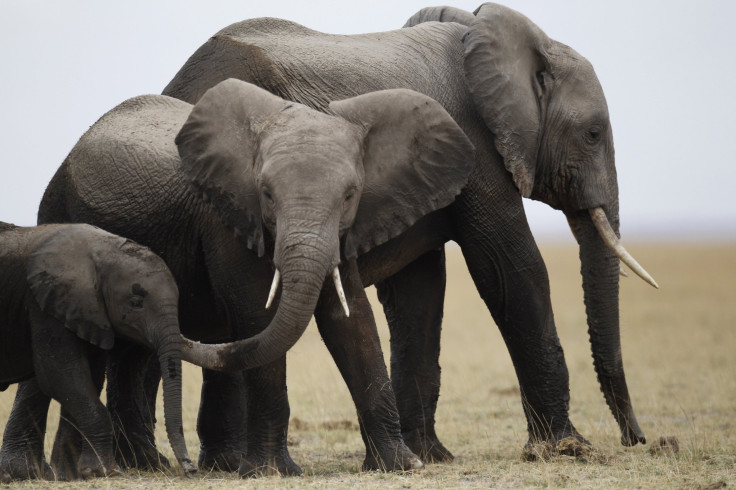Elephant Families Experience Symptoms Similar To PTSD, Are ‘Significantly Impaired By Manmade Disruption'

Humans aren’t the only social beings haunted by traumatic events. According to a new study on elephant behavior, elephants that survived a cull -- the systematic killing of older members of an elephant family to control elephant populations in African nature reserves -- were still affected by the events decades later.
Researchers from the University of Sussex in the U.K. and Colorado State University in the U.S. studied elephant herds that had witnessed wildlife officials kill their relatives during culls in the 1970s and 1980s. They found that the elephants’ “social understanding” were impaired, particularly when it came to appropriately responding to other elephants’ calls.
"There was no pattern at all to their responses," Karen McComb, a behavioral ecologist at the University of Sussex in the United Kingdom and co-author of the study, published in the journal Frontiers in Zoology, told The BBC. "This really suggests that the breakdown in their social fabric, even though it occurred decades ago, has had a real effect on their decision-making processes.”
McComb and her team compared two populations of elephants in Africa. The first, which lived in Kenya’s Amboseli National Park, was relatively undisturbed by culling efforts. The second population, in Pilanesberg National Park in South Africa, was made up of orphaned elephants who were brought there during the 1980s and '90s after their relatives were killed in management culls in Kruger National Park.
During a cull, an elephant family is herded into a tight bunch by a pilot in a helicopter. Hunters on the ground then shoot the elephants, letting only the young ones go free.
The idea behind culling is to keep elephant populations from becoming unmanageable. Too many elephants in one nature reserve can lead to trampled vegetation and uprooted trees.
Scientists recorded the elephants’ reactions to various recorded elephant calls and measured certain key behaviors, such as whether the elephants defensively crowded together or smelled for strangers. Wired reported that the elephants in Amboseli reacted normally. Typically, every member of the family stood still, and raised their ears to listen and their trunks to sniff for potential threats. They even charged past the scientists’ vehicle to search for the source of the call.
The Pilanesberg elephants, on the other hand, did not respond systematically to the researchers’ elephant recordings. Instead, their reactions were random, suggesting that they may struggle to distinguish between friends and enemies, One Green Planet noted.
“Elephants from the disrupted population showed no evidence of discriminating between callers when age-related cues simulated individuals on an increasing scale of social dominance, in sharp contrast to the undisturbed population where this core social ability was well developed,” researchers noted in the study.
“On the surface, they look like they’re now getting on okay,” McComb told Wired. “But we found a way to go deeper into their minds, and that’s how we found the deficits in the social decisions that they make.”
The study, titled “Effects of social disruption in elephants persist decades after culling,” concluded that exposure to trauma may affect elephants’ long-term decision-making abilities that are “fundamental to living in complex societies.”
“There is an assumption that wildlife responds to increasing pressure from human societies only in terms of demography,” researchers wrote. “However our study demonstrates that the effects may be considerably more pervasive. These findings highlight the potential long-term negative consequences of acute social disruption in cognitively advanced species that live in close-knit kin-based societies, and alter our perspective on the health and functioning of populations that have been subjected to anthropogenic disturbance.”
Other scientists recognized the importance of the study for understanding elephant behavior and how a cull or hunt can negatively impact surviving members of an animal family. “It is a groundbreaking study, because it is the first to demonstrate, experimentally, a direct connection between the effects of culling and specific psychosocial harms,” Lori Marino, a neuroscientist and expert on dolphin behavior at Emory University in Atlanta, who was not involved with the research, told Wired. “It shows unequivocally that elephants are psychologically damaged by culling.”
© Copyright IBTimes 2024. All rights reserved.






















